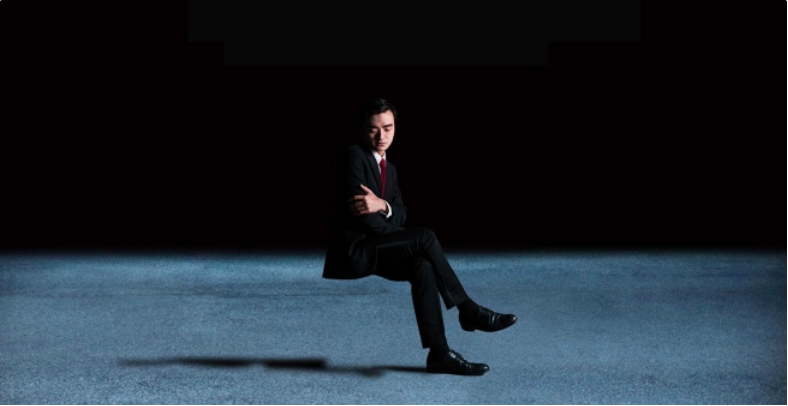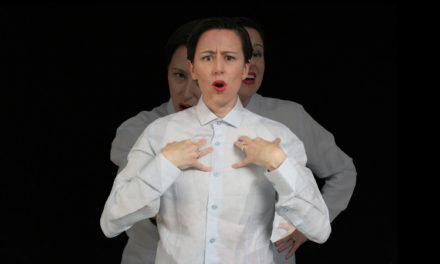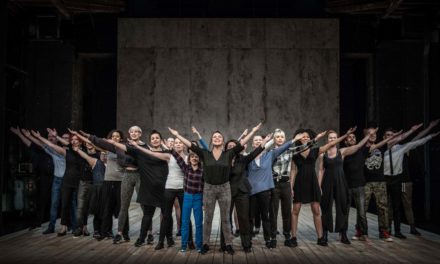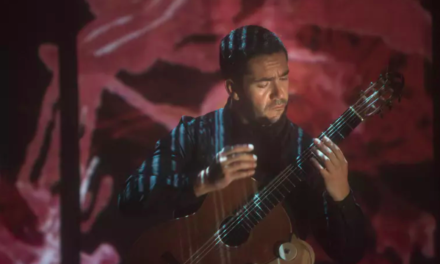Jonas McLean reviews Mr. Shi and His Lover, Wong Teng Chi and Njo Kong Kie’s contemporary Mandarin language opera about love, gender, sex, and power:
Meta-theatricality has long been a common technique in theatre of all kinds, and certainly in forms such as opera. The National Arts Centre is no stranger to shows that directly address their audiences, or shows that deal explicitly with the challenges of theatre. In fact, I don’t recall the last time a show at the National Arts Centre left the fourth wall fully intact. Mr. Shi and His Lover is therefore not unique in this regard, but – rather than falling into the pitfall of meta-theatricality for meta-theatricality’s sake – ensures that its distinct style remains necessary to the story’s telling.

Jordan Cheng. Photo by Cylla von Tiedemann
The show, directed by Tam Chi Chun, is inspired by the real-life story of Shi Pei Pu (Jordan Cheng), a Chinese opera singer, and Bernard Boursicot (Derek Kwan), a French diplomat stationed in China during the 1960s. 20 years after the beginning of their relationship, Boursicot is accused of passing classified information to the Chinese government through Shi, and they are both arrested on charges of espionage. During the trial, it is revealed that Shi, while presenting as a woman, is AMAB (assigned male at birth), a fact of which Boursicot claims to have been unaware. The ambiguous interplay between Shi’s gender identity and presentation – as well as the true extent of Bouriscot’s knowledge of them – poses complex questions to which no easy answers are offered.
Instead of retelling this story chronologically, the production presents itself as a character study, exploring the thoughts of Shi and Bouriscot through seven non-linear scenes. The pair of lovers attack and undermine each other constantly; “You love me” is hurled as an accusation, sparking conflict rather than intimacy. When alone on stage they each philosophize widely about existence and their place within the world. Shi gives a surprisingly nuanced and theoretical lesson in performance as he explains how he uses art to escape the tedium of everyday existence. Cheng’s portrayal of Shi is stunning, demonstrating an impressive range both vocally and emotionally.
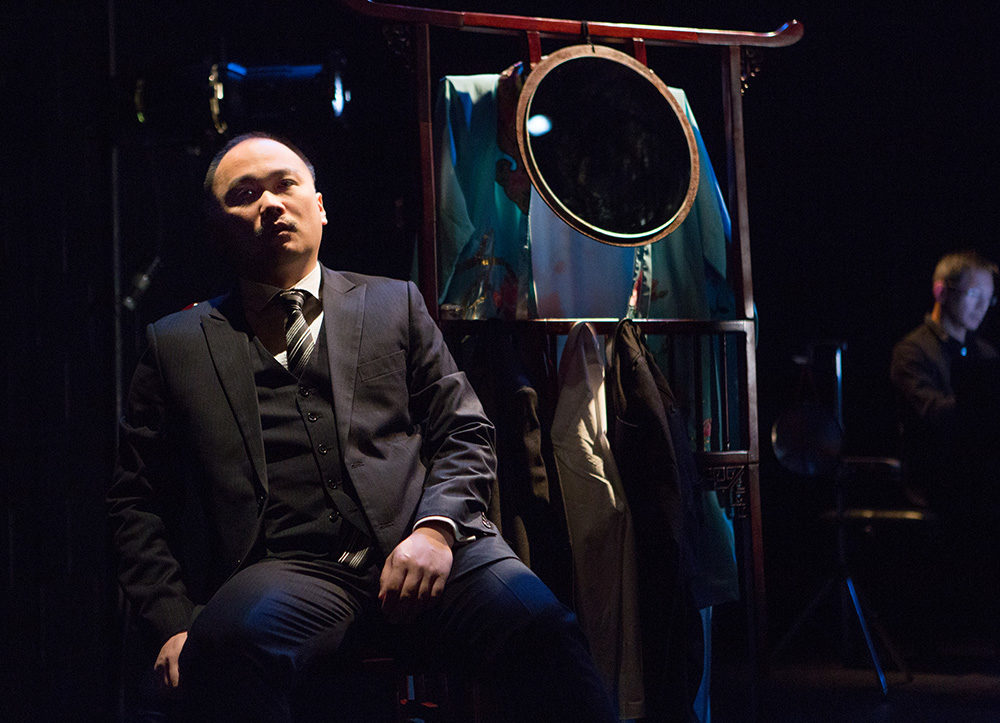
Derek Kwan. Photo by Cylla von Tiedemann
Boursicot reveals himself to the audience slowly, using a mountain of allusions to both Chinese and Western literature and folklore to express anguish he cannot convey in his own words. Kwan’s physicality is what makes Boursicot so sympathetic, this inner anguish visible in every gesture… As the scenes progress, time loses its meaning as stories and concepts begin to blur together and challenge assumptions about love, gender, sex, and power.
Structured in part as an opera, the show is sung in Mandarin with Mandarin and English subtitles. The accompanying music is played live by Kong Kie and Yukie Lai, and it is thrilling to witness them in action on stage rather than having them hidden behind the scenes. Surrounding the musicians is a deceptively simple set – designed by director Chi Chun – consisting of a single carpet, wooden chair, and an ornate mirror on which hang all the costumes used throughout the show.

Jordan Cheng. Photo by Cylla von Tiedemann
Every object we see has a purpose; more to the point, this stage contains nothing superfluous, a trait echoed in Fung Kwok Kee Gabriel’s lighting design. Light and shadow play across the actors’ faces to great effect, casting doubts on their motivations and words. These design elements are instrumental in establishing the atmosphere of an unreal place: perhaps the world of dream, perhaps a world between dreams and reality, between truths and lies.
Wong Teng Chi’s script draws on and plays with a wide array of traditions and practices, such as the Beijing Opera tradition of male performers playing female roles. One comes to appreciate Boursicot and Shi’s relationship as representative of a greater cultural intermixing between East and West, and the cultural differences in assumptions around gender, through their intermingled references without needing to understand the references themselves.
This is the NAC English Theatre’s first non-English language production, and I must confess that leaving this show I felt an uncertainty at the prospect of reviewing a Mandarin-language show from my white Anglo-Canadian perspective. Reflecting on the show, I have the impression that this uncertainty is, for me at least, the whole point. In an article for Intermission Kwan, who also worked on the English translations for the show, points out the real lack of non-English language performance in Toronto (and, I would add, Ottawa). If we are going to change that, many of us are going to feel uncertain for a while. We must treat this transitionary period as an opportunity to learn.
Mr. Shi is not a show to be watched passively. To say nothing of the need to read the subtitles, there are moments where text, costume, voice, and movement all play together in a subtle dance of meaning that invites us to ponder them long after we have left the theatre. If this production has a failing it is the effort required by the audience. At approximately one hour in I began to feel like we were moving in circles and, while I believe this appropriately mirrored the experiences of the characters, it instilled in me a very real fatigue. Nevertheless, I was soon brought back to full attention by a shift in the performance (which I will not reveal it here so as to preserve the surprise). Instead, I encourage you to see this show yourself. This near-exhaustion is worth it – it might even be the point.
This post originally appeared on alt. theatre on January 19, 2018 and has been reposted with permission.
This post was written by the author in their personal capacity.The opinions expressed in this article are the author’s own and do not reflect the view of The Theatre Times, their staff or collaborators.
This post was written by Jonas McLean.
The views expressed here belong to the author and do not necessarily reflect our views and opinions.

